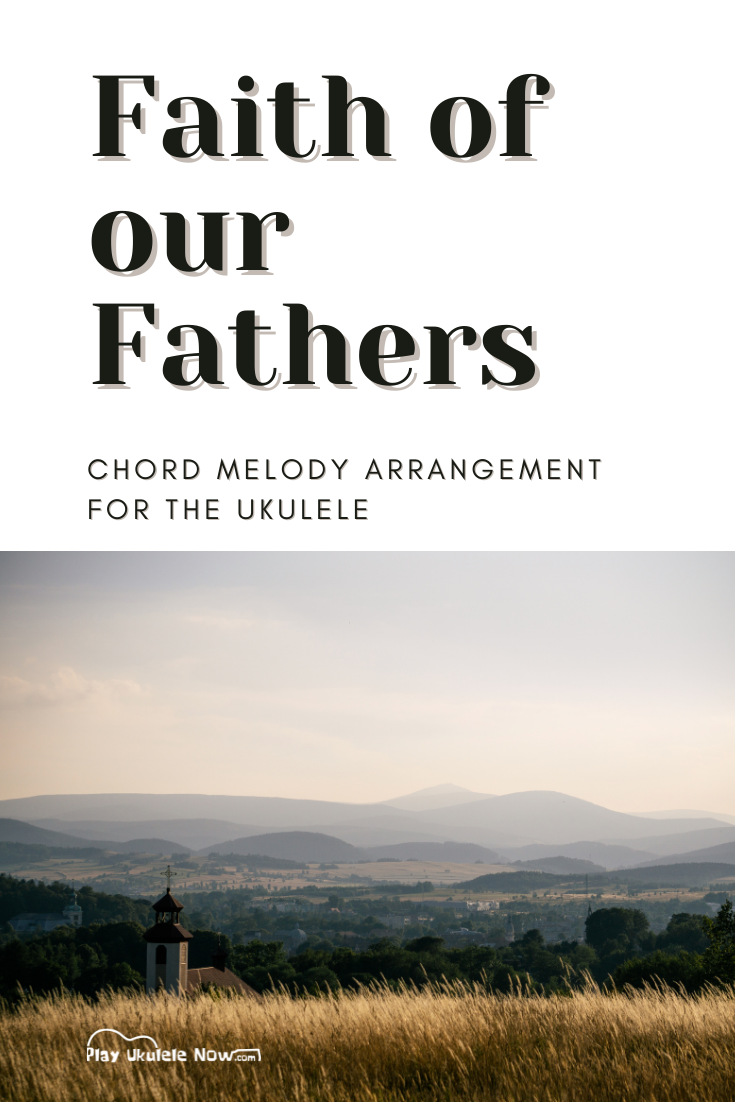You will Learn More and Play More with Play Ukulele NOW.
Find out for yourself why teachers and students have depended on Play Ukulele NOW Methods and Songbooks since 2009
Find out for yourself why teachers and students have depended on Play Ukulele NOW Methods and Songbooks since 2009
DISCLOSURE: THIS POST MAY CONTAIN AFFILIATE LINKS, MEANING I GET A COMMISSION IF YOU DECIDE TO MAKE A PURCHASE THROUGH MY LINKS, AT NO COST TO YOU. PLEASE READ MY DISCLOSURE FOR MORE INFO.
Find all my fingerstyle and chord melody solos here.
Here are some helpful tips to get you started with fingerstyle on the right track:
Are you holding the ukulele wrong? Avoid these 5 mistakes
Beginning fingerstyle ukulele made easy
Here's a video on beginning fingerstyle and two basic songs you can play to get it down
"Faith of our Fathers" is a popular Catholic hymn written by Frederick William Faber in 1849 in memory of Catholic martyrs persecuted by the Church of England in the time of Henry VIII and Elizabeth.
Everyone will love this "extra beautiful" arrangement!
Here we use the easiest of all C chords (measure 1) for a melody note on the 7th fret - we just fret the note on the 7th fret and play the rest of the strings open; playing strings 2, 3 and 4 open gives us a C triad.
The hardest chords here will be the G and the G7,the G7 (measures 15 and 23) you may be familiar with, it's a very common dominant 7 chord form; the G (measure 19) on the other hand may be new to you. There's also a full barre in measure 17.
The G (measure 19) will come up alot in chord melodies because we often have a melody note on the 5th fret (of the first string) and need to play a G chord. The alternative would be an E form with the lowest note being then melody note on the 5th fret. I show you a trick to simplify this chord below.
Try it and see if you can hear the difference (after you try the two) between the G and the G5... What do you think?
Performance Notes
Hold chords to let notes ring whenever possible.
This can be played very slowly - it sounds geat thet way, this makes the piece easier to perform.
Measures 1 & 2: Let the C triads ring while playing other notes, strum the chords with your thumb and alternate i and m for single notes (see previous lessons for details on alternating i and m).
Measure 3: Use your 3rd fringer to barre for the Dm triad, then your 1st finger for the note on the 4th string - let these notes ring together if you can; the fret the last note in the measure with your second firnger.
Measure 15: If you can, move your 4th finger to fret note onthe 7th fret while still allowing the chord to ring, then move it back to fret the next note on the 5th fret - still letting the chord ring.
Measure 18: Here's our full barre chord - lay your first finger across all the strings at the 5th fret and use your 4th finger to fret the note on the 8th fret.
Measure 19: We can simplify the G chord if you need to: If we simplify it we'll be taking out the 3rd, so it won't be as rich in harmony, and we'll have a G5 chord. To do this do not fret the note on the 4th string and play that string open; you now have a G5 that's quite a bit easier to play.
More...
Want to get more into fingerstyle ukulele?
LEARN MORE (fingerstyle ukulele book):
These arrangements are hauntingly beautiful, with many campanella passages, and majestic; steeped in rich harmonies.
They are carefully arranged and graduated; each song comes with a comprehensive lesson to help you perform it properly.
RETLATED VIDEOS:
Here's some basic info to get you rolling with fingerstyle.
More information and links to two songs that go with the lesson.
Here you'll learn how to hold the uke to get the best possible sound out of it:
More information here.
Have fun!
Share this with your "ukulele friends"







.png)





No comments:
Post a Comment